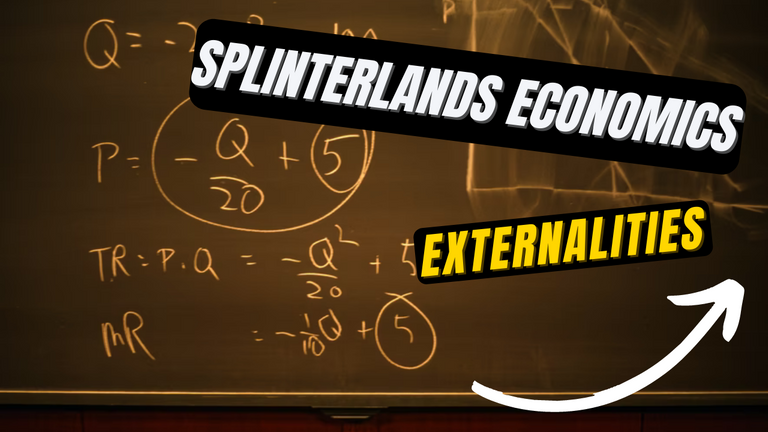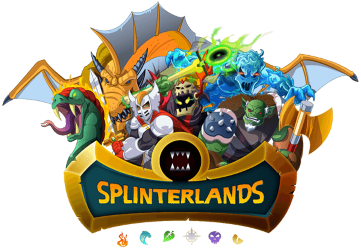Hello everyone! We are back again today with another edition of Splinterland Economics - a series in which we introduce a basic economic concept and then apply it to Splinterlands. If this is your first time reading, just to tell you a little bit about myself: my day job is in an unrelated area but I consider myself a little bit of economics nerd - I read a little (or maybe way, way) more news than I should, double majored in econ, and am obsessed with optimization. I love the way Splinterlands is equal parts card game and resource allocation game. My goal with these articles is to share a little bit of what I know with you all.
Our topic today deals with figuring out what the costs and benefits of a good are. Oftentimes, the true cost of something is not completely reflected in the price tag or by its effects on the buyer or the seller. And on the other side, a good may have more effects than we might think at first glance. Our subject today is Externalities!

What are Externalities?

Usually when we look markets or purchases, we talk about a supplier or seller, who transfers a good to a consumer or buyer, in exchange for a price. An externality is some sort of effect, positive or negative, that does not directly affect the buyer or seller of a good. A few possible externalities are pollution, overcrowding, or network effects. For example, a factory producing goods may pollute the surrounding environment and have negative health impacts, or a car purchase may cause the roads to become more crowded and result in more traffic jams. Externalities are not all bad though - as more people join a social network or buy a cellphone then those corresponding networks become more useful, and vaccinations protect other people by reducing the overall spread of diseases.
Externalities are important because this means that the price tag on a particular item does not always represent its true cost. For anyone following along with all of these Splinterlands Economics articles, this concept is related (though not identical to) common goods and the tragedy of the commons.

When we talk about quantities of goods and optimization, the optimization is when MR = MC, that is, marginal revenue (or benefit) equals marginal cost. When externalities are involved then the buyers and sellers act according to a price which is not consistent with the cost (or benefit) to society. This means that the quantity of that good which is produced and sold may not be optimal. For example, if the price of motor vehicles doesn't reflect the pollution and road congestion that the vehicles cause, then more vehicles would be sold than are socially optimal, resulting in a worse environment and more traffic.
What is the solution to the problem or externalities? Well, there are plenty of options and we could talk about alternative solutions all day, but two common ones are that people can collectively decide to police themselves, or a central government can align prices with more accurate numbers by levying taxes or providing subsidies.
How do we apply it to Splinterlands?

There are plenty of examples of externalities in Splinaterlands. A prime example is the crowding effect of earning DEC from the ranked rewards pool. As we discussed in one of my previous articles, the ranked rewards pool is a common good. The rate at which the rewards pool is replenished depends on a number of factors which I am not going to go into detail on now, because they are (for the most part) not dependent on individual behavior. However, what we do care about in our discussion today is that the rewards pool is limited and shared among all players participating in ranked battles. You can think of the rewards pool as getting more "crowded" as more players (human or not) decide to play matches. This means that as more people play, the rewards for everyone else decrease - a negative externality.
Another example of externalities lies in the infrastructure that Splinterlands runs on. Splinterlands resides on the Hive blockchain, and there is a limited amount of computing power available at any given time. More transactions taking place mean that things can take a longer amount of time to go through - if anyone is wondering why SPS snapshots take so long, or if you remember how the game used to go down every end of season, this is why! More transactions happening mean that everyone else needs to wait, or pay additional RC.
The final example of externalities in Splinterlands that I am going to mention today is our community - on Hive, Discord, and elsewhere. Posting or promoting spam, hating on others, or putting up otherwise toxic content both makes everyone who reads it feel worse, but also makes it harder to find the quality stuff - a double whammy of negative externalities! On the other hand, the more players active on Hive or on social media, the easier it is to get in contact with other players or to find other people interested in the same things you are, a positive externality that we call a "network effect".
Why should we care?

Knowing about externalities can help us to better understand why certain things are the way they are, in Splinterlands and in the real world. Wondering why there are Resource Credit costs on Hive, or why the developers charge a 5% fee on market transactions? You can think of both of these as "taxes" on market transactions in order to prevent (to a degree) high frequency trading and arbitrage from clogging up the blockchain. Curious about why you're paying a additional tax on gasoline or cigarettes? You can look at those as ways in which the government is ensuring that the true costs of those goods (pollution, overcrowding, etc.) are passed on to you, the consumer.

Externalities can also help us to view how our actions affect other people and entities. This is particularly important because not all externalities are compensated for with a price tag. Depending on where you live, there may not be a cost for skipping recycling and just throwing everything away. And regardless of your location, there are probably no fees (explicit ones, anyway!) for blasting your music into the wee hours of the night or for making all of those low-quality spam posts on your social network of choice. And although we have focused more on negative externalities here today, doing things like picking up after yourself when you go outdoors or taking the time to help a new Splinterlands player figure out how to play may end up being more beneficial than you might first think. Being aware of externalities, whether we are explicitly paying for them or not, allows us to make better decisions about what we are doing in the world.
Thank you so much for reading all the way to the end. Interested in seeing some more of my writing in the future? Be sure to give me a follow! In the meantime, if you'd like to see some of my recent posts:
Let Me Reintroduce Myself - Hello Hive (and Splinterlands too!) - My (very, very belated) personal introduction.
A Thorny Quix-tuation - Using the Dragon Splinter in Battle! - This past week's battle challenge, featuring Chaos Knight!
Splinterlands Economics: Pareto Optimality - A introduction to pareto optimality, and how it can help you out in Splinterlands.
Thinking about giving Splinterlands a try but haven't signed up yet? Feel free to use my referral link: https://splinterlands.com?ref=bteim, and be sure to reach out to me if you have any questions!

